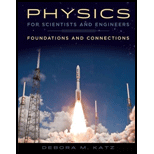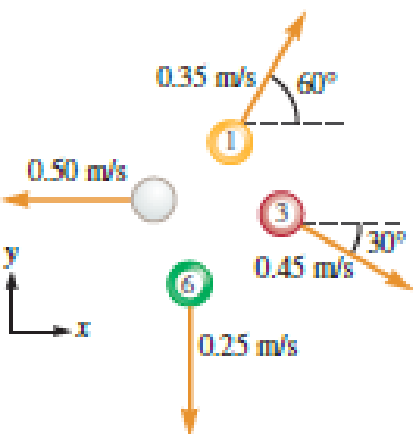
A billiard player sends the cue ball toward a group of three balls that are initially at rest and in contact with one another. After the cue ball strikes the group, the four balls scatter, each traveling in a different direction with different speeds as shown in Figure P10.30. If each ball has the same mass, 0.16 kg, determine the total momentum of the system consisting of the four balls immediately after the collision.

FIGURE P10.30
Total momentum of four balls after the collision.
Answer to Problem 30PQ
The total momentum of the four balls after collision is
Explanation of Solution
The player sends a cue ball to hit on a group of four balls. All the four balls were initially at rest and after their collision with the cue ball each of them scattered to different directions.
Write the equation to find the total momentum of the four balls.
Here,
Refer figure 10.30 provided in the problem. The figure gives the coordinate system of the system of four balls.
Consider each ball and write the component form of velocity vector for each ball.
Write the equation to find the velocity vector for ball 1.
Here,
Write the equation to find the velocity vector for ball 3.
Here,
Write the equation to find the velocity vector for ball 6.
Here,
Write the equation to find the velocity vector for cue ball.
Conclusion:
Substitute
Substitute
Substitute
Substitute
Substitute
Therefore, the total momentum of the four balls after collision is
Want to see more full solutions like this?
Chapter 10 Solutions
Physics for Scientists and Engineers: Foundations and Connections
- In general it is best to conceptualize vectors as arrows in space, and then to make calculations with them using their components. (You must first specify a coordinate system in order to find the components of each arrow.) This problem gives you some practice with the components. Let vectors A = (1,0, −3), B = (-2, 5, 1), and C = (3,1,1). Calculate the following, and express your answers as ordered triplets of values separated by commas.arrow_forwardOnly Part C.) is necessaryarrow_forwardOnly Part B.) is necessaryarrow_forward
- A (3.60 m) 30.0°- 70.0° x B (2.40 m)arrow_forwardIn general it is best to conceptualize vectors as arrows in space, and then to make calculations with them using their components. (You must first specify a coordinate system in order to find the components of each arrow.) This problem gives you some practice with the components. Let vectors A = (1,0, -3), B = (-2, 5, 1), and C = (3,1,1). Calculate the following, and express your answers as ordered triplets of values separated by commas.arrow_forwardfine the magnitude of the vector product express in sq meters what direction is the vector product in -z or +zarrow_forward
- 4) Three point charges of magnitude Q1 = +2.0 μC, Q2 = +3.0 μС, Q3 = = +4.0 μС are located at the corners of a triangle as shown in the figure below. Assume d = 20 cm. (a) Find the resultant force vector acting on Q3. (b) Find the magnitude and direction of the force. d Q3 60° d Q1 60° 60° Q2 darrow_forwardThree point charges of magnitudes Q₁ = +6.0 μС, Q₂ = −7.0 μС, Qз = −13.0 μC are placed on the x-axis at x = 0 cm, x = 40 cm, and x = 120 cm, respectively. What is the force on the Q3 due to the other two charges?arrow_forwardTwo point charges of +30.0 μС and -9.00 μC are separated by a distance of 20.0 cm. What is the intensity of electric field E midway between these two charges?arrow_forward
- Two point charges of +7.00 μС and +10.0 μС are placed inside a cube of edge length 0.100 m. What is the net electric flux due to these charges?arrow_forwardA conducting hollow sphere has a charge density of σ = 12.2 μC/m². If the sphere has a radius of 25 cm, what net charge is on the sphere?arrow_forward9) Consider an electric field right Ĕ = 21+3ĵ. What is the magnitude of the flux of this field through a 4.0 m² square surface whose corners are located at (x,y,z) = (0, 2, 1), (2, 2, 1), (2, 2, −1), (0, 2, −1)? Ꮓ ту x (0,2,1) Surface 2 Surface (2,2,1) y Ē (0,2,-1) (2,2,-1) 2 xarrow_forward
 Physics for Scientists and Engineers: Foundations...PhysicsISBN:9781133939146Author:Katz, Debora M.Publisher:Cengage Learning
Physics for Scientists and Engineers: Foundations...PhysicsISBN:9781133939146Author:Katz, Debora M.Publisher:Cengage Learning Principles of Physics: A Calculus-Based TextPhysicsISBN:9781133104261Author:Raymond A. Serway, John W. JewettPublisher:Cengage Learning
Principles of Physics: A Calculus-Based TextPhysicsISBN:9781133104261Author:Raymond A. Serway, John W. JewettPublisher:Cengage Learning University Physics Volume 1PhysicsISBN:9781938168277Author:William Moebs, Samuel J. Ling, Jeff SannyPublisher:OpenStax - Rice University
University Physics Volume 1PhysicsISBN:9781938168277Author:William Moebs, Samuel J. Ling, Jeff SannyPublisher:OpenStax - Rice University College PhysicsPhysicsISBN:9781285737027Author:Raymond A. Serway, Chris VuillePublisher:Cengage Learning
College PhysicsPhysicsISBN:9781285737027Author:Raymond A. Serway, Chris VuillePublisher:Cengage Learning Physics for Scientists and Engineers with Modern ...PhysicsISBN:9781337553292Author:Raymond A. Serway, John W. JewettPublisher:Cengage Learning
Physics for Scientists and Engineers with Modern ...PhysicsISBN:9781337553292Author:Raymond A. Serway, John W. JewettPublisher:Cengage Learning Glencoe Physics: Principles and Problems, Student...PhysicsISBN:9780078807213Author:Paul W. ZitzewitzPublisher:Glencoe/McGraw-Hill
Glencoe Physics: Principles and Problems, Student...PhysicsISBN:9780078807213Author:Paul W. ZitzewitzPublisher:Glencoe/McGraw-Hill





